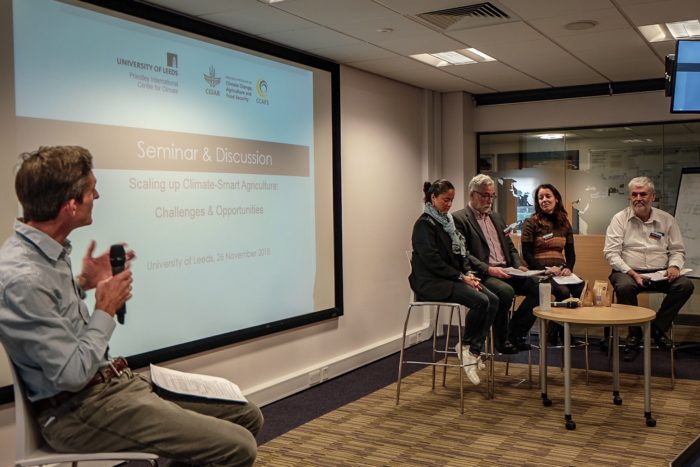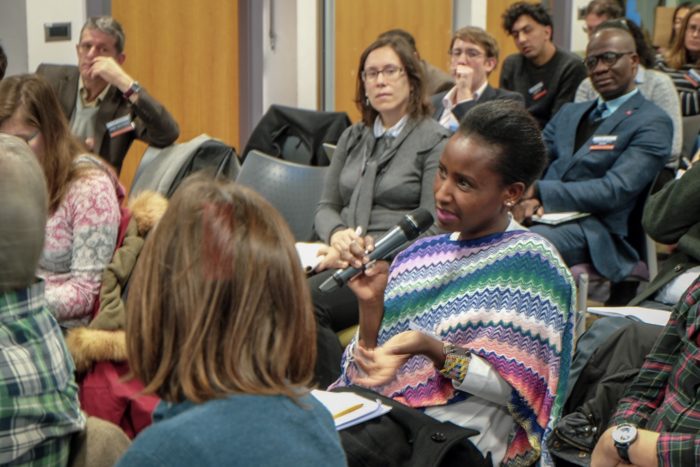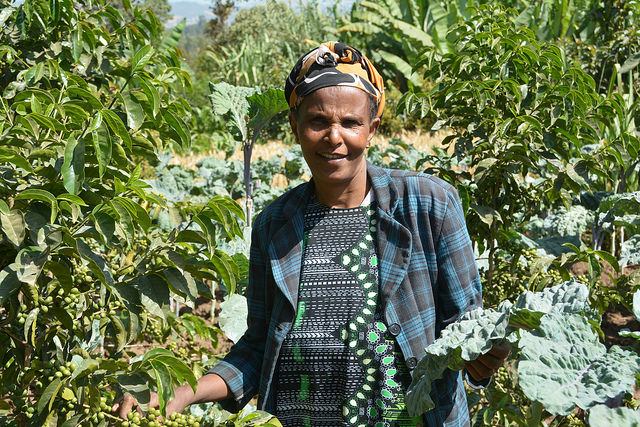Urgent action is needed to improve the livelihoods of half a billion farmers within a decade, empowering them with climate-smart techniques to transform global food systems.
That was the unanimous response of researchers and international stakeholders who met at a summit at the University of Leeds to discuss the increasing pressure from climate change and a growing world population on food security.
The event, to launch a new “learning platform” at the Priestley International Centre for Climate with the CGIAR Research Program on Climate Change, Agriculture and Food Security (CCAFS), saw experts from different disciplines and organisations coming together to discuss scaling up climate-smart agriculture and establish priorities for action.
The learning platform, which is supported by the UK Department for International Development (DFID), aims to enhance the resilience of farming communities to climate impacts while reducing greenhouse gas emissions from the agriculture sector.

Andy Challinor (left) chairs a panel discussion at the launch of the CCAFS learning platform at the University of Leeds (photo: Ratih Septivita, CCAFS)
Step change in policy
Andy Challinor, Professor of Climate Impacts, who chaired the first session and was a keynote speaker, welcomed the opportunity to build on the existing longstanding partnership and apply the breadth of expertise at Leeds. He said the combination of the Priestley Centre’s excellent research and access to specialist knowledge and the strength in policy advocacy in CCAFS would lead to “a step change in policy and downstream impacts of climate-smart agriculture.”
Climate-smart agriculture (CSA) takes an integrative approach to addressing the interlinked challenges of food security and climate change. It recognises the need to produce and distribute food whilst dramatically reducing emissions in order to curb climate change.
Globally, 19-29% of greenhouse gases come from agriculture, land use and forestry; livestock represents 14.5% of total emissions. Without increased mitigation, agriculture will be responsible for 70% of the total greenhouse gases that can be released if temperature rise is to be limited to 2°C – more than two thirds of the available carbon budget. It would make the preferred 1.5°C target impossible to meet.
Climate-smart agriculture has already produced transformative results, as demonstrated by recent outcomes from CCAFS and its partners. For instance, an investment of over $21 billion by the Indian government in the solarisation of farms (solar-powered pumps for irrigation) and curbing crop residue burning to improve public health and reduce emissions.
Among other notable success stories, new meteorological tools developed by the programme and its partners provide better climate forecasting for a population of 125 million in East and West Africa, allowing farmers to seed and harvest at the right moment, enhancing productivity and minimizing crop losses.

An audience member asks a question of the panellists at the Leeds event (photo: Ratih Septivita, CCAFS)
Challenge of scaling up
Bruce Campbell, Programme Director of CCAFS, who introduced a session on “Scaling up climate-smart agriculture: challenges and opportunities”, said that 500 million farmers will be impacted by climate change in the next decade and that greater effort was needed to scale CSA up and ensure that all aspect of the goal – increased productivity and resilience to climate change whilst reducing emissions – are met.
Ana Maria Loboguerreo, Head of Global Policy Research for CCAFS, described some of the many challenges being faced: over 800 million undernourished and a billion malnourished people in the world, while at the same time more than 1.4 billion adults are overweight and a third of all food produced is wasted. With the population projected to grow to more than 9.7 billion before 2050, food production will need to increase by 14% per decade at the same time as climate change impacts bringing increased challenges for agricultural productivity.
Alan Tollervey, Head of Agriculture Reseach for DFID, who attended the Leeds launch, reflected on the discussions, emphasising the key priorities of urban poverty, the need to engage with business and to deliver long term gains at scale.
The learning platform’s focus will be on generating, translating and synthesizing climate change knowledge at the regional and global levels so that CSA actions can reach millions of farmers and key stakeholders from the rural world. It will combine strong knowledge management and communications strategy and will leverage partnerships, capacity building, global outreach and climate finance to achieve outcomes at scale.
Strong partnerships
The UK Minister of State at the Department for International Development, Harriet Baldwin, signalled her support for the initiative:
“I am thrilled that this learning platform on climate-smart agriculture is opening today at the University of Leeds, thanks to UK Aid. It will contribute to the excellent work of the Priestley International Centre for Climate, and is a perfect example of how our international development work is not only benefiting developing countries, but the UK and the whole world as well.”
“The UK has already committed to £5.8bn in climate finance from 2016-2021. We have also helped over 47 million people to cope with the effects of climate change and natural disasters.”
Main image: Farmer in Doyogena Climate Smart Villages (John Recha, CCAFS)



